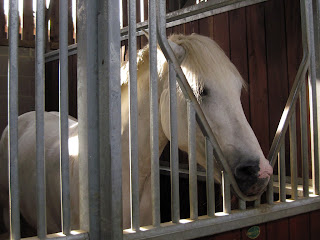 |
| Stable Vices can occur during long winter periods |
At this time of the year, many horses spend longer periods stabled, so some stereotypic behaviours such as weaving - caused when a horse leans its head over the top of a stable stall and grazes from side to side - and crib biting - where a horse periodically chews on wood inside the stable - become more common.
It is thought that some traditional deterrents such as anti-weave grilles - stainless steel grills mounted on stall doors - and cribbing collars can cause more harm than the vices themselves so many owners look for alternatives.
First of all, it is recommended that you turn your horses out as much as possible to avoid long, lonely periods in the same space, and it is also thought that larger paddocks may also help prevent boredom or feelings of stress within the confines of a stable.
Increased exercise and social activities are widely considered to be the best first line of defence against stress/boredom-related Stable Vices and sometimes, even putting up large pictures of other horses within the stable has been known to keep some horses calm and more comfortable by themselves.
There is some mystery surrounding the exact causes of as crib biting, however, there may be a link to acids in the stomach, and antacid supplements are now available. Whereas, Weavers and box walkers - horses that constantly walk back and forth within their stalls, sometimes out of anxiety or stress - can put strain on their limbs so in can help to make an opening at the back of the stable in order to give the horse a wider view and if possible, you can use rubber matting to alleviate any strain.
Rubber matting on the floor and coconut matting on the door are also useful tips to prevent horses from pawing the ground and banging doors. Horses tend to avoid these activities if they stop making a noticeable sound. Although many of these tips are universally effective, there is plenty of leeway for gentle experimentation on your own. There are a number of other simple, and perhaps more unorthodox ways of curbing Stable Vices by attacking the root causes such as boredom and stress. For example, stable owners have been known to let chickens into the yard, which gives a visual stimulus and can occupy horses who are left in their own space for long periods of time.
Above all else, if you are particularly worried about your horses behaviour, be sure to contact your local vet for advice. In the meantime, over the next few days we will be looking into some of the ways you can prevent boredom and unwanted physical effects brought on by Stable Vices in more detail, so be sure to check back for more info.
Thanks for the information, Rubber matting on the floor and coconut matting on the door are also useful tips to prevent horses from pawing the ground and banging doors.
ReplyDeletewww.stablesoft-europe.com